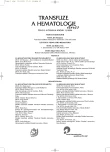-
Medical journals
- Career
TEL/AML1 increases sensitivity of leukemia cells to L-Asparginase by induction of metabolic stress
Authors: J. Stárková 1; O. Krejčí 1; B. Otová 2; K. Krejčíková 1; O. Hrušák 3; J. Starý 1; J. Trka 1
Authors‘ workplace: CLIP-Childhood Leukaemia Investigation Prague, Klinika dětské hematologie a onkologie, 2. LF UK Praha 1; Ústav lékařské biologie a genetiky, 1. LF UK Praha, 3Ústav imunologie, 2. LF UK Praha 2
Published in: Transfuze Hematol. dnes,12, 2006, No. 2, p. 70-75.
Category: Comprehensive Reports, Original Papers, Case Reports
Overview
L-Asparaginase is a drug commonly used in the therapy of childhood lymphoblastic leukaemias. A higher sensitivity to L-Asparaginase has been detected in patients with TEL/AML1 fusion gene. This genotypically-defined group is distinguished by a good response to the therapy, yet relapses still occur in 17% of children. L-asparaginase depletes asparagines and glutamine from extracellular enviroment. The activity of asparagine synthetase that synthesizes these amino acids is reduced in leukaemic cells. This paper, as well as some previous studies, paradoxically proves increased expression of asparagine synthetase in TEL/AML1[+] patients. The authors have carried out a deep analysis of the biochemical cascade that affects the synthesis of asparagine and glutamine in malignant lymphoid cells. The analysis of expression profiling data from patients with acute lymphoblastic leukaemias have showed significantly decreased gene expression of glutamate dehydrogenase in TEL/AML1[+] patients, as compared with TEL/AML1[-] patients. This phenomenon has also been confirmed by quantitative real-time PCR. The authors assume that an insufficient function of glutamate dehydrogenase leads to an insufficient synthesis of glutamine in the cell, leading to an increased expression of asparagine synthetase gene. The cellular metabolism’s ability to react to the limited asparagine and glutamine intake from extracellular enviroment following the administration of LAsparaginase is thus weakened. An explanation of the higher sensitivity to L-Asparaginase of the specific subgroup of patients could affect existing therapeutical procedures.
Key words:
L-Asparaginase, TEL/AML1, leukemia, asparagine synthetase, glutamate dehydrogenase
Labels
Haematology Internal medicine Clinical oncology
Article was published inTransfusion and Haematology Today

2006 Issue 2-
All articles in this issue
- Is WT1 gene hyperexpression a malignant cells marker?
- Hemorrhagic complications during warfarin therapy
- Non-invasive prenatal diagnosis from maternal peripheral blood is performed on fractionated extracellular fetal DNA with size < 500 bp
- Idiopathic thrombocytopenic purpura in pregnancy refractory to immunosuppressive treatment – case report
- Anagrelide in the treatment of thrombocytosis in myeloproliferative disease – case report
- B-cell chronic lymphocytic leukaemia
- Chronic idiopathic myelofibrosis: biological characterization and histological “grading” of the fibrosis with respect to diagnosis and prognosis
- TEL/AML1 increases sensitivity of leukemia cells to L-Asparginase by induction of metabolic stress
- Transfusion and Haematology Today
- Journal archive
- Current issue
- Online only
- About the journal
Most read in this issue- Chronic idiopathic myelofibrosis: biological characterization and histological “grading” of the fibrosis with respect to diagnosis and prognosis
- Anagrelide in the treatment of thrombocytosis in myeloproliferative disease – case report
- Hemorrhagic complications during warfarin therapy
- Idiopathic thrombocytopenic purpura in pregnancy refractory to immunosuppressive treatment – case report
Login#ADS_BOTTOM_SCRIPTS#Forgotten passwordEnter the email address that you registered with. We will send you instructions on how to set a new password.
- Career

